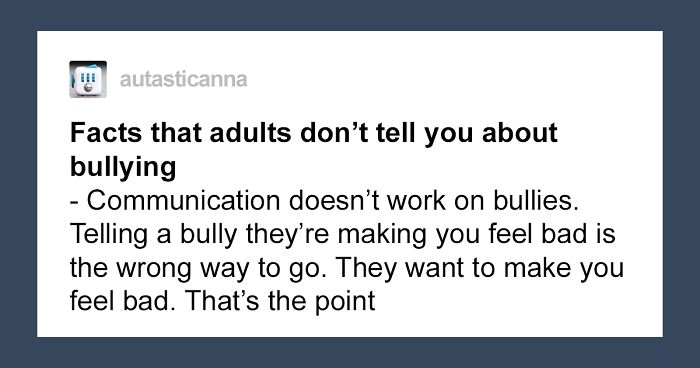
People Who Were Bullied Are Relating To These “Facts That Adults Don’t Tell You About Bullying” And Saying They’re True
Bullies aren’t born, they’re created. And they cause a lot of problems for people around them. Trying to help their victims — and everyone else — to make sense of it all, Tumblr user autasticanna shared what they consider to be “facts that adults don’t tell you about bullying.”
The post quickly went viral on the platform, and has already generated over 183,000 notes. But probably the comment section is what really highlights the list’s insightfulness. People who have been bullied themselves have been saying they found a lot of truth in autasticanna’s words. So continue scrolling and check them out. Maybe you will, too.
Image credits: autasticanna
Deliberately harming and humiliating others, specifically those who are smaller, weaker, and simply more vulnerable in general, peaks around ages 11 to 13 and decreases as children grow older.
While physical aggression such as kicking, hitting, and shoving is most common among younger children, relational aggression (damaging or manipulating the relationships of others by spreading rumors and social exclusion) is more common as children mature.
Experts say bullies become bullies very early in life: if the normal aggression of 2-year-olds is not handled with consistency, they fail to acquire internal restraints against such behavior. Thus, bullying remains a very durable behavioral style, largely because bullies get what they want.
Research shows that bullies have a distinct psychological makeup. They lack prosocial behavior, are untroubled by anxiety, and have little empathy. They do not really understand how others feel. They exhibit a kind of paranoia, too: they misread the intentions of others, often imputing hostility in neutral situations. Also, even though others may not like them, bullies typically see themselves quite positively.
Bullies, however, don’t pick on everyone. According to research, their victims lack assertiveness even in non-threatening situations and radiate fear long before they ever encounter a bully. Generally, these are children who don’t stand up for themselves and have poor social skills and few close friendships.
In the aftermath of repetitive bullying, victims may develop anxiety, depressive symptoms, and eating disorders.
With regard to anxiety, studies found that frequent bullying was a predicting factor for anxiety disorders in early adulthood.
As the post was going viral, people had a lot to say about it
I was bullied the entire way through school. It continued after school until I got hold of all of the bastards one by one and beat the crap out of them. I thought it would make me feel better but I regreted it after cos I should have done it sooner. I still dont trust many people and its left me with severe anxiety and deppression 30 years later. Now though if I see someone being bullied I stand up for them
This post! Yes! This 'movie' idea that all bullies come from homes where they are always the victim is bull___. My bully came from a home where he was raised by bullies and trash people who got their self esteem by taking it from others. He thought I was his punching bag and would walk by and just punch me in the face, stomach, back... No reason, just punch and then call me something awful. I returned from school break 4 inches taller and a bit bigger than I left...he took his usual swing at me and I beat him in the face so badly he could not open his eyes for days. Happy first day of school you sack of sh__! That SOB never so much as looked at me again. Do not let bullies continue. Ask for help and if that fails, fight. back.
He was raised by bullies but you don't think he was being bullied at home?? Definitely not trying to defend him but it seems like his home life and upbringing could not have been great.
Load More Replies...It's not only US. I've been bullied after my parents divorce, for 3 years. When I told the teacher and then the headmaster, they just told me that it's my fault. Being beaten, stolen from and other stuff... "It's your fault, you provoke them." At age of 14 I've realized there's no such thing as "authority" just from the position. And it's not worth to "respect" anyone just because he/she is being a boss, a teacher, a policeman, a doctor or whatever else with "position". 16 years later, it's still a valuable lesson And yes, the bullying stopped after ugly fighting back..
I completely agree with you on the respect authority statement. Sometimes people in positions like that sit on their high horse and feel like they can treat people badly because they’re an authority and feel like they can get away with it.
Load More Replies...I was bullied the entire way through school. It continued after school until I got hold of all of the bastards one by one and beat the crap out of them. I thought it would make me feel better but I regreted it after cos I should have done it sooner. I still dont trust many people and its left me with severe anxiety and deppression 30 years later. Now though if I see someone being bullied I stand up for them
This post! Yes! This 'movie' idea that all bullies come from homes where they are always the victim is bull___. My bully came from a home where he was raised by bullies and trash people who got their self esteem by taking it from others. He thought I was his punching bag and would walk by and just punch me in the face, stomach, back... No reason, just punch and then call me something awful. I returned from school break 4 inches taller and a bit bigger than I left...he took his usual swing at me and I beat him in the face so badly he could not open his eyes for days. Happy first day of school you sack of sh__! That SOB never so much as looked at me again. Do not let bullies continue. Ask for help and if that fails, fight. back.
He was raised by bullies but you don't think he was being bullied at home?? Definitely not trying to defend him but it seems like his home life and upbringing could not have been great.
Load More Replies...It's not only US. I've been bullied after my parents divorce, for 3 years. When I told the teacher and then the headmaster, they just told me that it's my fault. Being beaten, stolen from and other stuff... "It's your fault, you provoke them." At age of 14 I've realized there's no such thing as "authority" just from the position. And it's not worth to "respect" anyone just because he/she is being a boss, a teacher, a policeman, a doctor or whatever else with "position". 16 years later, it's still a valuable lesson And yes, the bullying stopped after ugly fighting back..
I completely agree with you on the respect authority statement. Sometimes people in positions like that sit on their high horse and feel like they can treat people badly because they’re an authority and feel like they can get away with it.
Load More Replies...







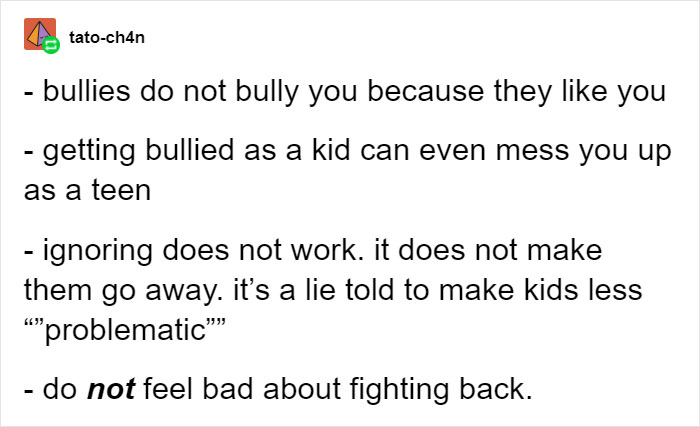

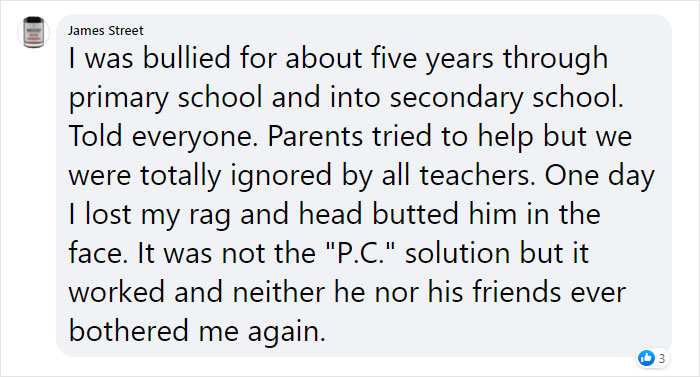


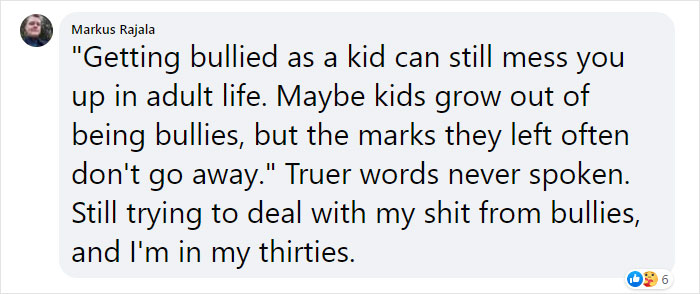
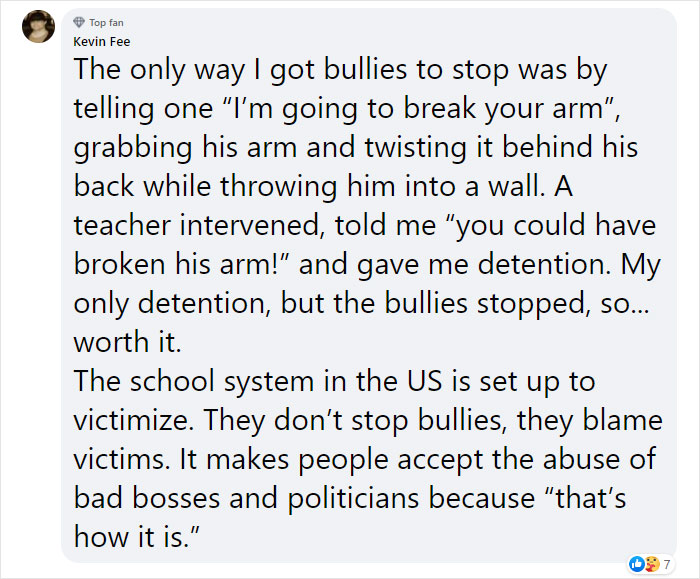
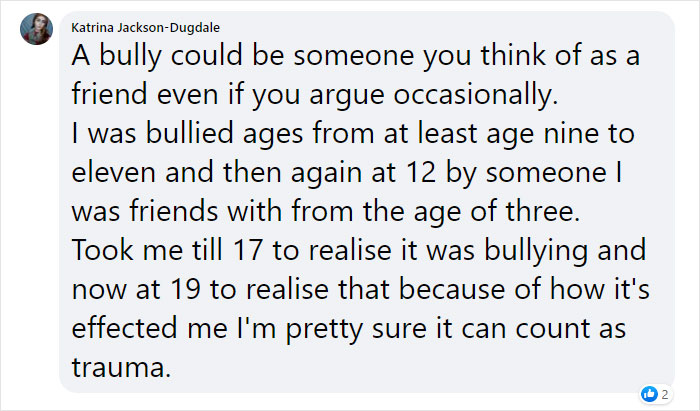
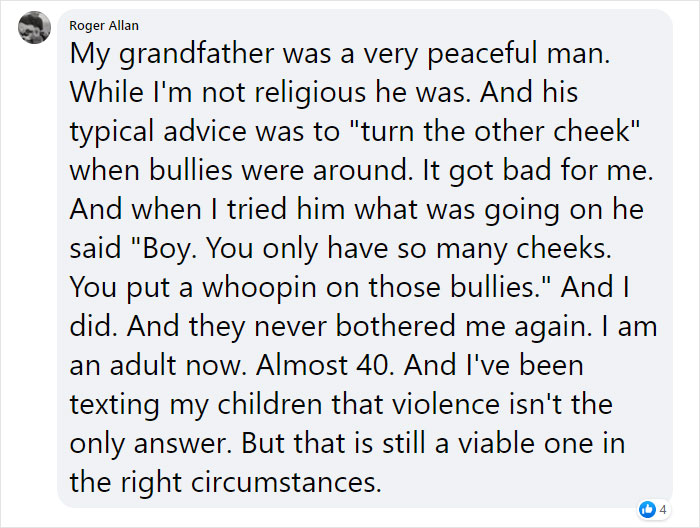
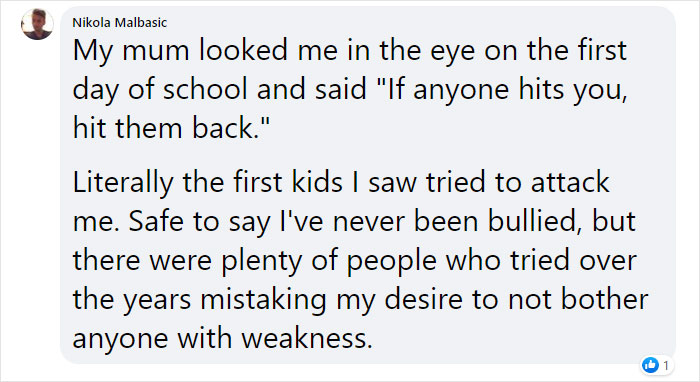





161
89